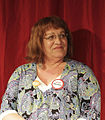Welcome to the Transgender portal Being transgender is distinct from sexual orientation, and transgender people may identify as heterosexual (straight), homosexual (gay or lesbian), bisexual, asexual, or otherwise, or may decline to label their sexual orientation. The opposite of transgender is cisgender, which describes persons whose gender identity matches their assigned sex. Accurate statistics on the number of transgender people vary widely, in part due to different definitions of what constitutes being transgender. Some countries, such as Canada, collect census data on transgender people. Generally, fewer than 1% of the worldwide population are transgender, with figures ranging from <0.1% to 0.6%. Many transgender people experience gender dysphoria, and some seek medical treatments such as hormone replacement therapy, gender-affirming surgery, or psychotherapy. Not all transgender people desire these treatments, and some cannot undergo them for financial or medical reasons. The legal status of transgender people varies by jurisdiction. Many transgender people experience transphobia, or violence or discrimination towards transgender people, in the workplace, in accessing public accommodations, and in healthcare. In many places, they are not legally protected from discrimination. Several cultural events are held to celebrate the awareness of transgender people, including Transgender Day of Remembrance and International Transgender Day of Visibility, and the transgender flag is a common transgender pride symbol. (Full article...) Selected article The Compton's Cafeteria Riot occurred in August 1966 in the Tenderloin district of San Francisco. This incident was one of the first recorded LGBT-related riots in United States history, along with the Cooper Do-nuts Riot, preceding the more famous 1969 Stonewall Riots in New York City. It marked the beginning of transgender activism in San Francisco. The 1960s was a critical time period for sexual, gender, and ethnic minorities—social movements which honed in on civil rights and sexual liberation came into fruition, and even churches, like the Glide Memorial Methodist Church in San Francisco, began reaching out to the transgender community. Still, many police officers resisted this change and continued to abuse and ostracize transgender people. This simultaneous rise in support for transgender rights on one side, and the unwillingness to accept these new ideas on the other, created the strain that would fuel the riot at Compton's Cafeteria in the summer of 1966, in which a transgender woman resisted arrest by throwing coffee at a police officer and drag queens poured into the streets, fighting back with their high heels and heavy bags. Selected biography Leelah Alcorn (November 15, 1997 – December 28, 2014) was an American transgender girl whose suicide attracted international attention. Alcorn had posted a suicide note to her Tumblr blog, writing about societal standards affecting transgender people and expressing the hope that her death would create a dialogue about discrimination, abuse and lack of support for transgender people. Assigned male at birth, she was given the name Joshua Alcorn and raised in Ohio by a family affiliated with the Churches of Christ movement. At age 14, she came out as transgender to her parents, Carla and Doug Alcorn, who refused to accept her female gender identity. When she was 16, they denied her request to undergo transition treatment, instead sending her to Christian-based conversion therapy with the intention of convincing her to reject her gender identity and accept her gender as assigned at birth. After she revealed her attraction toward males to her classmates, her parents removed her from school and revoked her access to social media. In her suicide note, Alcorn cited loneliness and alienation as key reasons for her decision to end her life and blamed her parents for causing these feelings. She killed herself by walking into traffic on the Interstate 71 highway. Alcorn arranged for her suicide note to be posted online several hours after her death, and it soon attracted international attention across mainstream and social media. LGBT rights activists called attention to the incident as evidence of the problems faced by transgender youth, while vigils were held in her memory in the United States and United Kingdom. Petitions were formed calling for the establishment of "Leelah's Law", a ban on conversion therapy in the U.S., which received a supportive response from U.S. President Barack Obama. Within a year, the city of Cincinnati criminalised conversion therapy. Alcorn's parents were criticized for misgendering Leelah in comments that they made to the media, while LGBT rights activist Dan Savage blamed them for their child's death, and social media users subjected them to online harassment. Alcorn's parents defended their refusal to accept their child's identity and their use of conversion therapy by reference to their Christian values. Did you know (auto-generated) -
This month's birthdays
More did you know...
Random quoteIt is difficult to generate a counterdiscourse if one is programmed to disappear. The highest purpose of the medically defined transsexual is to erase h/erself, to fade into the "normal" population as soon as possible. Part of this process is known as constructing a plausible history--learning to lie effectively about one's past. What is gained is acceptability in society. ... In the transsexual's erased history we can find a story disruptive to the accepted discourses of gender. Related portalsSelected picturesTopics
CategoriesWikiProjects WikiProjects are non-hierarchical peer-run groups which serve as a resource for the communication on, and collaboration of, content within a specific topic area. Related WikiProjects: Things you can do
Associated WikimediaThe following Wikimedia Foundation sister projects provide more on this subject:
|
Discover Wikipedia using portals




























